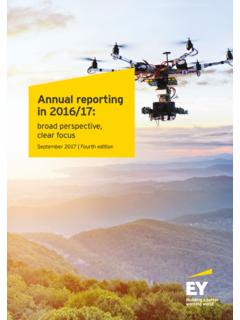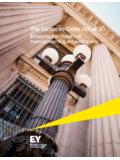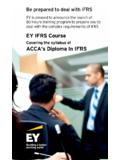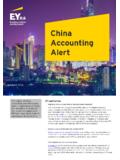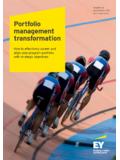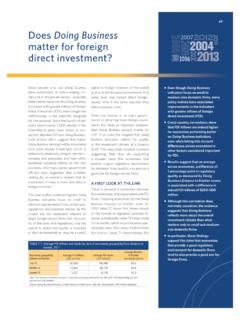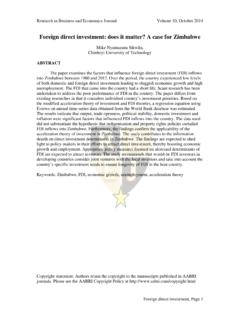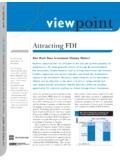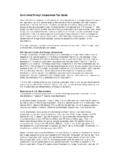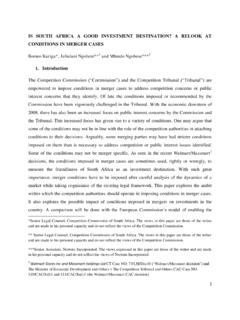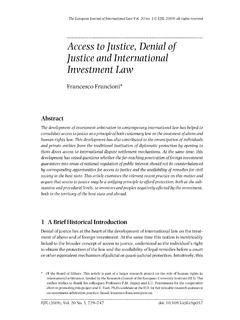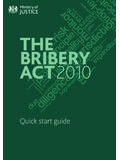Transcription of Remittances - EY
1 RemittancesPrivate Client Services1 General rulesThe taxation of individuals in the United Kingdom is determined by their residence and domicile. Domicile is a complex matter of general law; not of tax law. It essentially denotes the country or state one considers his permanent home, the country with which one has the closest personal, family and economic connections, the place to which one would wish to retire even if one temporarily does not live you wish to learn more about domicile, please refer to our materials describing this concept in accordance with the current UK legislation the following individuals are considered tax residents in the UK: Anybody who spends at least 183 days in the UK in a tax year (the period from 6 April of the current year till 5 April of the following year). Some individuals who spend fewer than 183 days in a tax year. This would depend on duration and reason of stay, a pattern of visits in previous years and connections with the UK, including the individual s family location in the UK, availability of UK property, work or social connections, 6 April 2013 the rules will change with the introduction of a Statutory Residency Test (SRT).
2 The 183 day test will remain and in addition there will be a full time work test and a simpler day count test based on the number of connecting factors an individual has with the UK (family in the UK, accommodation in the UK, UK workdays and time spent in the UK in previous years). Ordinary tax residency is a separate tax status for an individual within the current UK legislation. An individual is considered ordinarily resident in the UK if they came to the UK voluntarily, with a settled purpose for residing in the UK (including work). This status will be abolished from 6 April 2013 under the new SRT remittance a choice not to report and be taxed on world-wide income in the UK The remittance basis is a beneficial tax basis in the UK available for non UK domiciled individuals. Briefly under the remittance basis the individual is taxed on their foreign income and gains if and when the individual brings (remits) them to the UK.
3 The remittance basis is claimed on the tax return and only remitted foreign income or gains need to be reported on the tax should be noted that where an individual elects for the remittance basis he is no longer able to claim the income tax personal allowance and the capital gains tax annual exemption. It is important that a taxpayer who elects for the remittance basis of taxation understands when foreign-sourced income or gains is or are considered remitted to the 6 April 2008, when the rules with respect to this regime significantly changed, a remittance is made to the UK if: Any money or other property is brought to, received or used in, the UK by, or for the benefit of, a relevant person , or A service is provided in the UK to, or for the benefit of, a relevant person and the consideration for the service is overseas funds or is property which derives from overseas funds, or Overseas money or other property is used overseas in respect of a UK this purpose a relevant person includes.
4 The individual The individual s spouse/civil partner (including unmarried couples living together as husband & wife or as civil partners) A minor child or grandchild of the individual or the individual s spouse/civil partner A close company (or a company which would be close if UK resident) in which a person in any other category is a participator A company which is a 51% subsidiary of a close company in which a person in any other category is a participator22 The trustees of a settlement where a person in any other category is a beneficiaryFor example, a remittance will occur in the following situations: An individual transfers funds from an overseas bank account containing foreign income to a UK bank account. An individual s spouse uses a credit card in the UK then the individual pays off the credit card using funds in a foreign bank account. A remittance basis user pays for a friend s holiday in another country in return for the use of a UK property.
5 An individual purchases UK situs investments through an overseas broker, paying the purchase price outside the UKWhilst the rules above can be used to determine many of the situations in which a remittance will occur, the rules regarding Remittances are very complex and therefore it would be prudent for a remittance basis user to seek advice before any major or complicated FundsIt is important to identify clearly what is being remitted as the UK now has legislation governing mixed funds . A mixed fund is money or other property which contains, or derives from, income of more than one tax year or capital of more than one tax year or a mixture of income and capital. For example a bank account that contains clean capital as well as interest earned on that capital. While the remittance of clean capital is not taxable in the UK, a remittance of income/gains is taxable. For UK tax purposes, income or gains are divided into the following categories:1.
6 UK employment Foreign employment income not subject to a foreign Relevant foreign income ( foreign trade profits, foreign rental income, foreign investment income) not subject to a foreign Foreign capital gains not subject to a foreign Foreign employment income subject to a foreign Relevant foreign income ( foreign trade profits, foreign rental income, foreign investment income) subject to a foreign Foreign capital gains subject to a foreign Income or capital not covered a remittance takes place from a mixed fund then ordering rules are invoked and the amount remitted is deemed to take place first from income and gains of the current tax year in the order stated above ( out of UK employment income first, then foreign employment income not subject to UK tax, etc). If the income and gains of the current tax year have been fully used (or if the fund includes no income and gains relating to the current tax year) then the income and gains of the pervious tax year are deemed to be remitted in the order as listed above.
7 The process is repeated for earlier years in reverse chronological order and, thus, the oldest categories are remitted order of Remittances may be disadvantageous for a taxpayer as, with the exception of UK taxed employment income, the first Remittances will be those that suffer the highest tax should be noted that for transfers overseas (for instance a transfer of cash from one overseas account to another or a transfer/gift to another individual overseas) the amount transferred is usually deemed to be a pro-rata of the contents of the initial monies in the account on the day of the above matching rules will apply to income/gains received after 6 April 2008. Remittances matched against pre 6 April 2008 funds will take into consideration the total make-up of the account at that time disregarding the tax year in which the funds Basis Charge (RBC)The annual RBC is payable by all individuals who claim the remittance Basis and have been UK resident in at least seven of the last nine tax years (subject to limited exemptions).
8 The amount of the Charge depends on the length of time the individual has been resident in the UK. The remittance basis charge is 30,000 for those individuals who have been resident in the UK in at least 7 of the last 9 tax years. From 2012/13 the charge is increased to 50,000 for individuals who have been resident in the UK in at least 12 of the last 14 tax years. Payment of the Charge means that non UK income and capital gains of the relevant tax year escape UK tax unless or until they are remitted (actually or constructively) to the UK. Funds brought from overseas to pay the Charge are not treated as a remittance , so long as they are paid directly (electronically or by cheque drawn on an overseas bank account) to HMRC and not paying the remittance basis charge, the individual will have to nominate overseas income and/or capital gains in respect of which the charge is paid. The charge is then treated as being tax paid on the nominated income and/or capital gains.
9 The individual may either nominate a nominal amount ( 10 or less) or the full amount of income or gains that give rise to tax equal to the RBC ( 100,000 income if a 50% taxpayer paying the 50,000 RBC) There are complex rules should more than 10 of the nominated amount be remitted to the UK. It is strongly recommended that professional tax advice is obtained in this respect. 44 Exemptions Items that do not count as taxable remittancesIn certain circumstances, foreign income/gains can be brought to the UK without being regarded as remitted and so without being chargeable to UK are examples: Payment of the 30,000/ 50,000 remittance basis charge is not regarded as a remittance itself if paid direct to HMRC ( by cheque or electronic transfer) from overseas funds. However, care needs to be taken as, if the charge (or part of it) is repaid by HMRC, a remittance (of the amount repaid) will arise at the date of repayment.
10 Payment for services provided in the UK that relate wholly or mainly to property situated overseas will not be regarded as a remittance providing that payment is made direct to an overseas bank account of the service examples of exempt property include:- Property made available for public access (for instance works of art). Property brought to the UK for repair or restoration. Property (other than money or similar) where the notional amount remitted is less that 1,000. Property (other than money or similar) that has only been remitted temporarily (for less than 275 days) and used by, or for the benefit of, a relevant person. Clothing, footwear, jewellery and watches acquired using overseas funds that are owned and used by a relevant 6 April 2012, a new relief became available, Business Investment Relief (BIR), that allows non-domiciled individuals and other relevant persons (including certain trusts and companies) to invest overseas income and gains in qualifying investments in the UK without incurring a tax charge.



